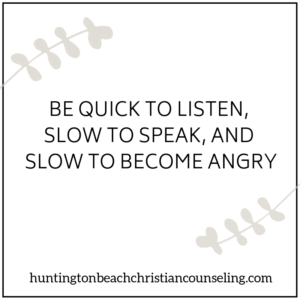Signs of Anger Issues to Be Wary of
Anger is one of those emotions that seems big, bold, brash, and hard to hide. That’s because in a lot of instances, when people feel and express their anger, that’s the form it takes. There are endless stories about anger gone wrong, whether at a family gathering like a wedding, Christmas, or Thanksgiving, or dustups between perfect strangers at a local buffet, restaurant, gas station, or parking lot. The internet sometimes seems to run on anger.
With anger so prominent in everyday situations, you’d think we’d be better at identifying it in ourselves and dealing effectively with it. There are sometimes subtle signs of anger that we either don’t take to be anger or that we ignore for various reasons. Detecting anger issues in your life can help to save your relationships and promote your well-being.
Where Anger Issues Come from
What exactly are anger issues? Being angry and expressing that anger doesn’t necessarily mean that you have anger issues. When a person has anger issues, it means that they struggle to control their anger, and that loss of control often has negative consequences in their life, some of them small, but some of them big. Anger has a dominating presence in that person’s life.
If you don’t work on any anger issues you may have, that can affect all areas of your life, including your work, your relationships, and your health. While anger issues are quite destructive, they can also feel like a normal part of one’s life, especially when they are part of longstanding patterns.
Some of the work of undoing anger issues is rooted in understanding where anger issues come from. This differs from person to person, as anger issues can stem from a combination of biological, psychological, and environmental factors, as these interact with the individual’s personality and temperament.
Anger issues may have a biological component. Some inherited traits and one’s temperament may contribute to anger issues. Experiencing changes or fluctuations in your hormone levels, such as your testosterone or cortisol levels, can influence your anger. Lastly, having imbalances in your brain chemistry can also affect whether and how you regulate your mood well.
Psychological factors such as mental health conditions, experiences of childhood trauma, and stress or frustration can all contribute to feelings of anger. Health conditions such as anxiety, depression, or bipolar disorder can all have increased levels of anger and irritability as symptoms.
In terms of environmental factors that might play a role in anger, your family dynamics and upbringing can shape your behavior, including how you understand and relate to your anger. If you’re exposed to violence and anger, or the cultural and social norms you’re immersed in navigate anger in unhelpful ways, it can also contribute to anger issues. Anger may also become a problem if you find yourself in difficult life circumstances that trigger anger.
Apart from these main factors, other things that can trigger anger issues include struggling with medical issues like chronic pain or thyroid disorders, substance abuse, or sleep deprivation. These and other factors may lie under a problem with anger.
How Anger Can Upend Your Life
When you get angry, there is no telling where it’ll take you if you let it. Some things are good servants and poor masters, and anger is one of those things. Anger can upend your life in significant ways.
Along with this goes the idea, “Be angry and do not sin.” As a person who has come under the leadership of Christ and the support of the Spirit, anger is not essentially bad but can become so when not controlled and given the reins to steer your choices. Anger, in controlled usage, can draw attention to wrongdoing and urge the wrongdoers to change their ways (i.e., a picked-on person saying “you need to stop spitting spit wads at me because that is not okay”).
Anger in uncontrolled, sinful form can seek to attack, humiliate, or damage the wrongdoers and end situations altogether (i.e., a picked-on kid (or bully) punching or damaging or humiliating the other person).
Some of the ways unbridled anger can be disruptive in your life include:
Damaging relationships When you don’t manage your anger well, it can lead to frequent and deep conflict with the people in your life. Angry outbursts can strain relationships with others, and you may say things in anger that you later regret. If you’re an angry person, people may walk on eggshells around you or avoid you altogether, leading to social isolation.
Affecting your work life Anger can result in conflict with clients, coworkers, or supervisors, which may result in job loss. If it doesn’t get that far, anger can still impair your judgment by impairing your decision-making and problem-solving skills, impacting job performance. Unmanaged anger may also lead to accidents, injuries, and reckless behavior on the job, which endangers you and other people.
Impact on physical health When you’re angry, it’s a whole-body experience. Anger activates your fight-or-flight response, putting your body on high alert for threats. If you are angry a lot and if the anger is intense, that taxes your body. Chronic anger can increase the risk of cardiovascular disease, high blood pressure, a weakened immune system, and stomach issues like ulcers, irritable bowel syndrome, and acid reflux.
Impact on mental health Just as anger affects your body, it also affects your mind. If your anger isn’t under control, it can contribute to depression, anxiety, low self-esteem, and feelings of guilt and shame. To cope with anger and its effects on one’s life, some people turn to substance abuse, which worsens the situation.
 Legal and other consequences Anger can lead to bad decision-making, like assaulting other people or damaging property. This can result in legal action being taken against you, as well as being arrested and possibly convicted. Anger can also lead to financial problems, especially when the anger escalates and results in losing work or facing lawsuits for damage caused to people and property out of anger.
Legal and other consequences Anger can lead to bad decision-making, like assaulting other people or damaging property. This can result in legal action being taken against you, as well as being arrested and possibly convicted. Anger can also lead to financial problems, especially when the anger escalates and results in losing work or facing lawsuits for damage caused to people and property out of anger.
Uncontrolled anger can take a difficult situation and make it worse. This makes it all the more important to address anger issues to deal with life problems without worsening them or creating new ones.
Signs of Anger Issues
Can you tell when you’re getting angry? It’s possible to know yourself well enough to clock when you’re starting to get angry. For some, they feel their face flush or their ears start to burn. Perhaps your heart rate increases, and you get a sense of tunnel vision. Maybe you start talking quite fast and gesturing a lot. Or maybe you go quiet, and you clench your jaws and fists. Each of us has our unique reactions when we start to get angry.
Anger issues can manifest in different ways, and sometimes it’s possible to not even realize that one has a problem with anger. Here are some signs of anger issues to be wary of:
Irritability and mood swings One sign of anger issues is if you easily get annoyed or frustrated, even over small or inconsequential things, and you experience sudden shifts in your mood. If you are irritable or your mood shifts are deep and hard to get out of, that too could point to anger issues.
Sarcasm and passive-aggressive behavior Sometimes, people will express their anger in quieter, more indirect, and less confrontational ways. This includes using sarcasm, backhanded compliments, sulking, rolling your eyes, procrastinating, or other indirect expressions of anger.
Feeling tightness or tension in the body This occurs because you may be frequently clenching your jaws, fists, or tensing your shoulders, indicating pent-up anger or frustration.
Avoiding conflict or difficult conversations Another subtle sign that could point to anger issues is dodging hard discussions or situations that might lead to conflict, instead of addressing issues head-on. If you don’t want to have such discussions because you’re worried about your reaction, especially how you’ll react if you get angry, that could point to anger issues.
Procrastination or passive resistance Another sign of anger issues is when you put off tasks or responsibilities, or you do them begrudgingly to express your anger or frustration with a person or your circumstances.
Overreacting or being overly critical Instead of reacting in a measured way, responding in an excessive or over-the-top way to minor setbacks or mistakes could lead to anger issues. Additionally, if you’re overly critical of yourself or others, that could also be the result of anger issues.
Difficulty relaxing or calming down If, when you get angry, you struggle to unwind or relax, or to calm yourself down even in peaceful environments, that could indicate anger issues.
Substance abuse or addiction Using substances to cope with or numb feelings of anger or the consequences of actions taken in anger may point to anger issues.
Physical complaints Experiencing somatic symptoms such as frequent headaches, stomach issues, high blood pressure, or other physical complaints may be the result of stress and anger issues.
Difficulty apologizing or forgiving If you struggle to admit mistakes you’ve made, to apologize, or to forgive yourself or others, it may be the result of unresolved anger or resentment.
People experience anger differently, and these signs may well point to anger issues, but they may also be rooted in another cause. If you’re concerned about your own anger or that of someone you know, you must consider seeking help from a mental health professional to help you identify and address any anger issues.
Addressing Anger Issues in Your Life
Dealing with anger issues is a process that takes time and concerted effort. There may be habits you’ve accrued over the years that are at play, and it takes time to identify these and begin to unravel and replace them with newer, healthier habits.
You can begin working toward addressing anger issues by taking time to reflect on when and why you get angry. Being able to identify patterns and triggers is a helpful step in learning how your own anger works. Anger issues can also be addressed by improving your communication skills, which include listening well to others, being able to express yourself clearly, and setting healthy boundaries in your relationships.
You must nurture your own well-being, and that includes getting enough sleep, eating well, and engaging in regular exercise and activities that calm you and bring you joy. You can make use of creative expression to articulate your feelings, and you can seek professional help in the form of anger management classes and therapy to help you identify and shift negative and unhealthy patterns of thought and behavior.
To learn more about managing anger and to meet with one of the faith-based therapists at our location, call us today.
Photo:
“Fire”, Courtesy of Eric Sanman, Pexels.com, CC0 License

 Have you ever felt so angry that your anger felt like it was a living, fire-breathing, or ice-cold thing inside of you? Perhaps a loved one had slighted you one too many times, or a friend questioned a choice you made or a cherished belief you hold, and it stirred up anger in you.
Have you ever felt so angry that your anger felt like it was a living, fire-breathing, or ice-cold thing inside of you? Perhaps a loved one had slighted you one too many times, or a friend questioned a choice you made or a cherished belief you hold, and it stirred up anger in you. 
 An anger outburst can affect a relationship in deep and negative ways. The damage done by an anger outburst may take a concerted effort to undo. But if the relationship matters to you, putting in that work to restore the relationship and get your anger under control should be more than worth it.
An anger outburst can affect a relationship in deep and negative ways. The damage done by an anger outburst may take a concerted effort to undo. But if the relationship matters to you, putting in that work to restore the relationship and get your anger under control should be more than worth it. Anger may be masking anxiety, or it may be the symptom of something else such as trauma, depression (especially in men), or chronic stress. Finding professional help from a counselor will help you understand your triggers and early warning signs of anger such as having knots in your stomach, seeing red, clenching your hands or jaw, your hands feeling clammy or face feeling flushed, breathing faster, and pacing around.
Anger may be masking anxiety, or it may be the symptom of something else such as trauma, depression (especially in men), or chronic stress. Finding professional help from a counselor will help you understand your triggers and early warning signs of anger such as having knots in your stomach, seeing red, clenching your hands or jaw, your hands feeling clammy or face feeling flushed, breathing faster, and pacing around. Depression is a mood disorder and a diagnosable mental health disorder; it is not simply what you feel when you’re going through a tough time. If a person feels sad after the loss of a loved one or another personal tragedy, that is to be expected and is a natural way for a person to deal with those events. If you’re struggling with depression,
Depression is a mood disorder and a diagnosable mental health disorder; it is not simply what you feel when you’re going through a tough time. If a person feels sad after the loss of a loved one or another personal tragedy, that is to be expected and is a natural way for a person to deal with those events. If you’re struggling with depression,  Depression often presents as feelings of deep sadness or apathy. However, a depressive episode doesn’t look the same for everyone who experiences it. For men, for example, the symptoms of a depressive episode, such as feelings of unworthiness and helplessness can translate into an increase in anger and irritability. Essentially, the sadness ignites the anger in some. That anger may be directed at events from your past, at yourself, or it may not have an object at all.
Depression often presents as feelings of deep sadness or apathy. However, a depressive episode doesn’t look the same for everyone who experiences it. For men, for example, the symptoms of a depressive episode, such as feelings of unworthiness and helplessness can translate into an increase in anger and irritability. Essentially, the sadness ignites the anger in some. That anger may be directed at events from your past, at yourself, or it may not have an object at all. To begin with, if you suspect you may be struggling with symptoms of depression, you should first get screened by a medical or mental health professional who can provide an assessment of your life history and the severity of your symptoms.
To begin with, if you suspect you may be struggling with symptoms of depression, you should first get screened by a medical or mental health professional who can provide an assessment of your life history and the severity of your symptoms. Finding the light when you’re feeling depressed and angry.
Finding the light when you’re feeling depressed and angry. If you’ve ever felt angry at someone or a situation, you probably know how powerful the emotion of anger is. It can color your perception of a situation or person, and it can motivate you to take action to fix whatever has gone wrong. As we look at anger in the Bible, we see that the action may or may not be appropriate, and it may or may not be wise.
If you’ve ever felt angry at someone or a situation, you probably know how powerful the emotion of anger is. It can color your perception of a situation or person, and it can motivate you to take action to fix whatever has gone wrong. As we look at anger in the Bible, we see that the action may or may not be appropriate, and it may or may not be wise. You can be angry, but what matters is what you then do with those feelings and thoughts. You can do constructive and godly things with it, or you can slander others or cause them physical harm. Holding onto anger for too long is also problematic, as that can affect how you relate to others. Lingering in anger longer than necessary is a recipe for relationship problems.
You can be angry, but what matters is what you then do with those feelings and thoughts. You can do constructive and godly things with it, or you can slander others or cause them physical harm. Holding onto anger for too long is also problematic, as that can affect how you relate to others. Lingering in anger longer than necessary is a recipe for relationship problems. Anger and the things that cause anger are a fact of life. It’s important to acknowledge that reality, and to learn how to rein anger in so that its expression is constructive and healthy. If you struggle with controlling anger, or if your life is marked by feeling angry most or all the time, you may have an anger problem that needs attention. You can begin dealing with anger through a few simple self-help techniques, which include the following:
Anger and the things that cause anger are a fact of life. It’s important to acknowledge that reality, and to learn how to rein anger in so that its expression is constructive and healthy. If you struggle with controlling anger, or if your life is marked by feeling angry most or all the time, you may have an anger problem that needs attention. You can begin dealing with anger through a few simple self-help techniques, which include the following: Then when you got to work, you were put on the spot about a project and your answer was less than satisfactory, and your colleague was more than happy to swoop in and “help you” give your boss what he needed. By the time you get home, you know it’s only a matter of time before whoever comes to you with their next request feels the impact of the wrath that’s been building up all day.
Then when you got to work, you were put on the spot about a project and your answer was less than satisfactory, and your colleague was more than happy to swoop in and “help you” give your boss what he needed. By the time you get home, you know it’s only a matter of time before whoever comes to you with their next request feels the impact of the wrath that’s been building up all day. commanders. In other words, our emotions are an important part of us that we need to pay attention to for the sake of our emotional, mental, physical, and spiritual health, but it’s dangerous to be led by them.
commanders. In other words, our emotions are an important part of us that we need to pay attention to for the sake of our emotional, mental, physical, and spiritual health, but it’s dangerous to be led by them. Anger can alert us to the fact that something is not right in our world. We get angry when we experience personal injustice, feel frustrated or threatened or attacked, or when we witness injustice in the world around us. That anger can move us to act in ways that bring positive change in the world.
Anger can alert us to the fact that something is not right in our world. We get angry when we experience personal injustice, feel frustrated or threatened or attacked, or when we witness injustice in the world around us. That anger can move us to act in ways that bring positive change in the world. You can bring anger under control by looking out for warning signs, such as a faster heartbeat, shallow breathing, or your body becoming tense, and that will give you a small gap to think about how you want to react to a given situation.
You can bring anger under control by looking out for warning signs, such as a faster heartbeat, shallow breathing, or your body becoming tense, and that will give you a small gap to think about how you want to react to a given situation. However, emotions, just like reason, should not be given free rein but must be brought under the authority of God’s Word. For example, the Bible warns of the dangers of holding onto emotions such as anger because they can negatively affect your heart and your relationships with people around you.
However, emotions, just like reason, should not be given free rein but must be brought under the authority of God’s Word. For example, the Bible warns of the dangers of holding onto emotions such as anger because they can negatively affect your heart and your relationships with people around you. Jonah. The prophet was angry with God because was gracious to the Ninevites when they turned from their evil ways and repented.
Jonah. The prophet was angry with God because was gracious to the Ninevites when they turned from their evil ways and repented. The Bible calls those who give full vent to their anger “fools.” When you read the word “fool,” it would be a mistake to think of someone who merely makes bad decisions. Rather, the book of Proverbs takes great pains to show the fool to be the one who refuses to live their life according to God’s commandments. The fool, in other words, is a sinner.
The Bible calls those who give full vent to their anger “fools.” When you read the word “fool,” it would be a mistake to think of someone who merely makes bad decisions. Rather, the book of Proverbs takes great pains to show the fool to be the one who refuses to live their life according to God’s commandments. The fool, in other words, is a sinner. jealousy, fits of anger, rivalries, dissensions, divisions, envy, drunkenness, orgies, and things like these. I warn you, as I warned you before, that those who do such things will not inherit the kingdom of God. But the fruit of the Spirit is love, joy, peace, forbearance, kindness, goodness, faithfulness, gentleness, and self-control.
jealousy, fits of anger, rivalries, dissensions, divisions, envy, drunkenness, orgies, and things like these. I warn you, as I warned you before, that those who do such things will not inherit the kingdom of God. But the fruit of the Spirit is love, joy, peace, forbearance, kindness, goodness, faithfulness, gentleness, and self-control. Anger is a normal human emotion, just like joy, fear, surprise, anticipation, and trust. Created in the image of God – who loves, gets jealous, has compassion, and expresses anger – our emotions are part of who we are and what makes us human.
Anger is a normal human emotion, just like joy, fear, surprise, anticipation, and trust. Created in the image of God – who loves, gets jealous, has compassion, and expresses anger – our emotions are part of who we are and what makes us human.  Because anger can be complicated (and can so quickly cause damage),, everyone could benefit from giving some careful thought to how we are to express and receive emotionally healthy expressions of anger. Let’s see what the Bible says about anger.
Because anger can be complicated (and can so quickly cause damage),, everyone could benefit from giving some careful thought to how we are to express and receive emotionally healthy expressions of anger. Let’s see what the Bible says about anger. Then Jesus asked [the Pharisees], “Which is lawful on the Sabbath: to do good or to do evil, to save life or to kill?” But they remained silent. He looked around at them in anger and, deeply distressed at their stubborn hearts, said to the man, “Stretch out your hand.” He stretched it out, and his hand was completely restored. – Mark 3:4-5
Then Jesus asked [the Pharisees], “Which is lawful on the Sabbath: to do good or to do evil, to save life or to kill?” But they remained silent. He looked around at them in anger and, deeply distressed at their stubborn hearts, said to the man, “Stretch out your hand.” He stretched it out, and his hand was completely restored. – Mark 3:4-5 What did Jesus mean by this? Among other things, He wanted His listeners to recognize that the state of their hearts is as important as their actions. Our actions spring from the condition of our hearts. Some anger is righteous, and some is sinful, and further, “Raca” was a term of contempt. Jesus doesn’t mean that we can’t feel and express anger, but unjustified anger is sin, as is anger that turns aggressive and abusive.
What did Jesus mean by this? Among other things, He wanted His listeners to recognize that the state of their hearts is as important as their actions. Our actions spring from the condition of our hearts. Some anger is righteous, and some is sinful, and further, “Raca” was a term of contempt. Jesus doesn’t mean that we can’t feel and express anger, but unjustified anger is sin, as is anger that turns aggressive and abusive. Although it’s certainly true that many people who need assistance barely show any anger at all, are they really as happy and carefree as they seem to be? Or, are they internalizing the struggle they are having with anger? Those who suppress their anger need anger management therapy just as much, if not more.
Although it’s certainly true that many people who need assistance barely show any anger at all, are they really as happy and carefree as they seem to be? Or, are they internalizing the struggle they are having with anger? Those who suppress their anger need anger management therapy just as much, if not more.  Therapy for managing anger can appear very different. It depends on who is participating. Whole families can be in therapy in which case, the whole family may react the same when it comes to being angry.
Therapy for managing anger can appear very different. It depends on who is participating. Whole families can be in therapy in which case, the whole family may react the same when it comes to being angry. There are those who honestly believe that anger is alright and they express their anger in ways that don’t hurt themselves or to others. Others are confused about anger, especially about it in a Christian light. They are concerned about how God views it.
There are those who honestly believe that anger is alright and they express their anger in ways that don’t hurt themselves or to others. Others are confused about anger, especially about it in a Christian light. They are concerned about how God views it. Understanding the things that cause you to feel angry is vital when it comes to working through anger problems. Whether it’s traffic that angers you, the tone of voice people use or being taken for granted, pinpointing the source or sources is important to finding a solution.
Understanding the things that cause you to feel angry is vital when it comes to working through anger problems. Whether it’s traffic that angers you, the tone of voice people use or being taken for granted, pinpointing the source or sources is important to finding a solution.


 Even children who are usually well behaved may encounter a situation where they are so overcome by emotion that they “lose it” and engage in inappropriate behaviors. This is especially true of very young children whose emotions are still in the early stages of development.
Even children who are usually well behaved may encounter a situation where they are so overcome by emotion that they “lose it” and engage in inappropriate behaviors. This is especially true of very young children whose emotions are still in the early stages of development. We all know it’s wrong to tell a lie, but we all do it from time to time. No matter what age, lying is a significant problem when it becomes habitual – so ingrained that the person’s word cannot be trusted. Some children become repetitive liars, which can make it difficult for parents to know when to believe the child. This could even put the child in harm’s way.
We all know it’s wrong to tell a lie, but we all do it from time to time. No matter what age, lying is a significant problem when it becomes habitual – so ingrained that the person’s word cannot be trusted. Some children become repetitive liars, which can make it difficult for parents to know when to believe the child. This could even put the child in harm’s way. If your child is usually cheerful and compliant, then abruptly begins to question your directives, or refuse to obey, this defiant attitude may be a way of asserting himself or testing boundaries. Your child may be disrespectful to you or other authority figures. Many times this behavior is picked up from peers or even TV shows.
If your child is usually cheerful and compliant, then abruptly begins to question your directives, or refuse to obey, this defiant attitude may be a way of asserting himself or testing boundaries. Your child may be disrespectful to you or other authority figures. Many times this behavior is picked up from peers or even TV shows. Children begin to experiment with cigarette smoking, drinking alcohol, or smoking marijuana around the age of thirteen. But children much younger than this engage in substance use, especially if it is readily available at home or from a friend or relative. Obviously, this behavior demands immediate attention before addictions develop or other serious issues ensue.
Children begin to experiment with cigarette smoking, drinking alcohol, or smoking marijuana around the age of thirteen. But children much younger than this engage in substance use, especially if it is readily available at home or from a friend or relative. Obviously, this behavior demands immediate attention before addictions develop or other serious issues ensue.